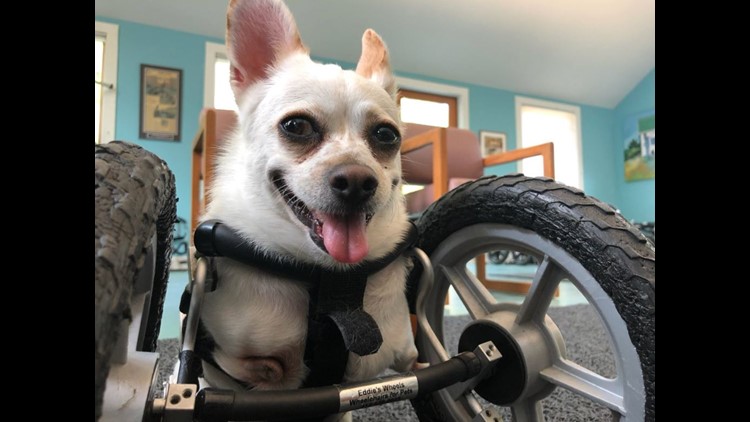SHELBURNE FALLS, Mass. (WWLP) — “There’s nothing that’s more of a death sentence for a dog than a down dog…”
They may not look like your average dogs, but below the surface they’re still the tail wagging’, treat chasing’, barking guard dogs that we know and love.
For the last 20 years, Eddie’s Wheels for Pets has custom designed 25,000 wheelchairs for disabled animals around the world. It all started 35 years ago when a Doberman named Buddha woke up paralyzed. The vet’s advice? Have her undergo a risky surgery or even worse, euthanasia.
Ed and Leslie Grinnell, now owners of Eddie’s Wheels for Pets, had other plans. Ed was a mechanical engineer with the resources to make his very first wheelchair. After six months in the wheelchair, Buddha was walking again.
“There are still miracles, but a lot of dogs will be permanently disabled,” Leslie said. “So this gives them quality of life. These dogs are just like every other dog. They’re fun, they’re great, they’re very grateful for their wheels. We change their lives and we change the lives of the owners because everyone gets to have their independence back.”
Ed and Leslie have been given disabled animals a second chance at life for decades. Neville, they’re most recent adoptee, was rescued from a hoarding situation in Chicopee, Massachusetts, earlier this spring. Before being equipped with his very own set of wheels, he never walked on his own in his three years of life.
“So Neville came in here being Neville– a little dog with no front legs who can wobble around on his back legs for a few steps but was entirely dependent on humans to carry him everywhere,” Leslie explained.
Fast-forward three months, and this is Neville now–a dog with so much spunk Leslie had to install an invisible fence because he kept wheeling beyond his boundaries.
Wheelchairs are not only an option for animals born with congenital defects. Like people, dogs run into health problems as they grow older.
“He still wants to play all the time, he still wants to chase his ball, so this will be the best for him…”
Laurie Tylaska, of Preston, Connecticut, made the two hour drive to Eddie’s Wheels for Pets Wednesday with her German Shephard Bentley whose back legs suddenly started to give out. She told 22News there isn’t anything she wouldn’t do for her pets.
“Bentley is my boo-boo baloo that’s my baby, my big whiny boy,” Laurie said. “I just know that this will be a great for him, he will be able to have his mobility back, he will be able to do everything that he loves again, chase his sisters around the yard go around with my daughter.”
Seconds after being placed in a trial set of wheels, Bentley was on the move again.
Finch is just another example of a dog who doesn’t let his disability define his life. A long-haired Chihuahua, Finch was found with a broken back at a trailer park in Tennessee last year.
“He’s the most fun dog I’ve ever had because he’s only a year and he likes to play with toys and he likes to chase and he gets the zoomies in his cart.”
Dakin Humane Society spokesperson Lee Chambers told 22News there are some people who actually look for animals with disabilities that make them unique.
“Sometimes their uniqueness in appearance can actually help them find their hero adopters, as most people that adopt from Dakin (and other shelters) want to do something special to help an animal,” Chambers said. “They tend to be more open to the idea of taking on an animal that needs special considerations, and we have detailed and honest conversations with them to determine if it will be a good fit and something realistic that they can take on. These hero adopters want to make a difference in an animal’s life, and we are always grateful for their dedication.”
At Eddie’s Wheels for Pets, love and compassion for animals is at the heart of the business.
“So much what we deal with is genetically linked and if people stop buying puppy mill dogs and buy responsibly-bred dogs and just get them from the shelter, our business would get much smaller and that would be OK,” Leslie smiled.



